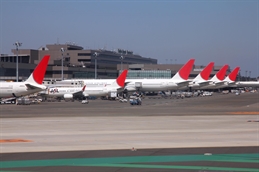
Asia’s airlines will see a mild rebound in cargo in the coming year officials from the International Air Transport Association (IATA) told sessions of its global and cargo media days.
IATA’s moderately (and well-qualified) optimistic view should cheer Asian carriers who rely heavily on their cargo operations, although the trade body frequently stressed its cautious approach, saying the coming year will be one of consolidation with challenges throughout.
Asia Pacific, as the largest cargo market, when measured by freight tonne-kilometres, is particularly vulnerable not just to broader economic problems but to its own twists on them, such as the US-China trade war, disputes between South Korea and Japan and the uncertain political situation in Hong Kong.
“We are expecting an improvement in Asia-Pacific but the risks are probably higher in that region than elsewhere. There are a lot of things that could go wrong and hinder the Asia Pacific,” Andrew Matters, IATA’s deputy chief economist, told a session focusing on cargo.
As background to this, IATA acknowledged that cargo will face a continuingly difficult business environment and is thus taking a cautious approach, saying 2020 will be the year of consolidation, albeit one where challenges will remain.
Obstructing a recovery is the broad-based nature of current economic weaknesses, which is a global pattern. Africa, the world’s smallest air cargo market, is the only market showing any growth.
“The industry is expecting that, in terms of cargo volumes, the sector is going to be a little bit better next year than last year,” Matters said. Describing it as “a very modest rebound,” Matters said that growth would be “something like 2%.”
Yields are not yet expected to break into positive territory, with Matters saying they would “flat to slightly lower.”
This may already be underway, with Matters pointing to recent changes in the market which have seen freight volumes stop declining – an important consideration, given IATA has recorded 12 months of contraction.
“The trend is more a sideways trend, but they’ve stopped falling,” said Matters.
Also of importance (and something with implications) is a difference between emerging and more advanced markets, with a clear divergence in business confidence in the two.
Emerging markets are confident sooner, and more so than their advanced counterparts, said Matters, although the advance markets have reported an uptick of late as well, he stressed.
Trying to firm this up by looking at export orders shows another mixed picture.
Interestingly, there are export orders between the US and China but these are the two countries currently waiting to hear if more tariffs were to be put into effect.
Among the other risks that IATA has identified are a global housing slump, which chokes consumer spending, a no-deal Brexit, and various geopolitical problems. But the biggest foreseen problem remains trade wars. “That’s key,” Matters said.
Cargo traffic turned negative last year for the first time since 2012, with a 3.3% annual decline in demand, seeing 61.2 million tonnes transported compared to 63.3 million tonnes in 2018.
Among the positive drivers IATA identifies are a forecast that GDP will expand by 2.7% in 2020 (marginally above the 2.5% growth in 2019) and a forecast that world trade growth will rebound to 3.3% from 0.9% in 2019.
More specific for the airlines, IATA pointed out lower energy prices, with oil prices expected to dip further in 2020 to US$63 for Brent Crude, bringing down jet kerosene prices to US$75.60 per barrel versus US$77 per barrel in 2019.
By Michael Mackey
Correspondent | Geneva



